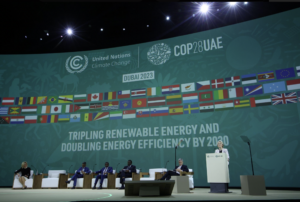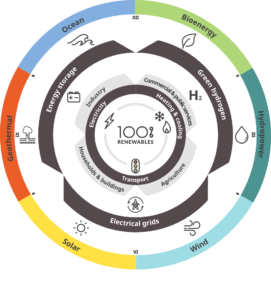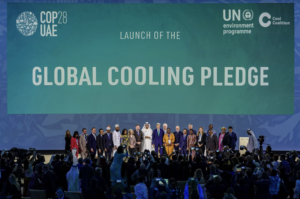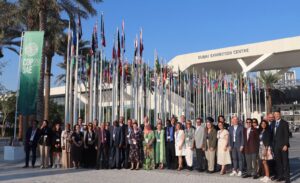COP28 Insights: Empowering Local Sustainable Energy Transitions
The 28th Conference of the Parties (COP28) marked a major milestone in the history of the UNFCCC process and global environmental efforts. Eight years have passed since the landmark Paris Agreement, where governments the world over committed to limiting the global rise in temperatures to 1.5°C compared to pre-industrial levels by mid-century.
This year’s conference was hosted at a time when the world is grappling with multiple crises concurrently, on top of the urgent need for action against climate change and its impacts. Yet, around 85,000 participants from across the globe, including governments, representatives from civil society, business, indigenous peoples, youth, philanthropy, and international organizations, came together with a collective resolve to address the challenges leading up to 2030. It saw parties conduct the first-ever ‘Global Stocktake’ to assess progress since 2015, resulting in the ‘UAE Consensus’.

Image: Inside the COP28 venue in Expo City, Dubai, UAE
Fossil fuels and their continued use took center stage, with many divergent views regarding their potential phasing out. However, parties including the COP28 Presidency did call for urgent action in terms of upscaling renewable energy and energy efficiency measures, as well as the need for more efficient cooling strategies and technologies. As the largest climate conference of the year, outcomes from COP28 will set the stage for future negotiations in the UNFCCC process. Below are some of the outcomes so far from COP28 and their repercussions, particularly in terms of the local sustainable energy transition and the role of local and regional governments.
RE-shaping the Energy Landscape
Transitioning from our primarily fossil-fuel-dependent energy system to one based on renewable energy (RE) is one of the key pillars on which the success of climate change action rests. Recognizing this reality, COP28 witnessed a surge in commitments from nations worldwide to increase the adoption and use of renewable energy sources and the rate of improving energy efficiency. At COP28, the COP28 Presidency, supported by the International Renewable Energy Agency (IRENA) and the Global Renewables Alliance, launched a global call to triple renewables capacity to 11,000 GW, and to double the rate of energy efficiency improvements from 2% to 4% annually by 2030.
International organizations such as the International Energy Agency (IEA) and IRENA lay out in their scenarios that such a drastic increase in renewables and energy efficiency is crucial to achieve net-zero by 2050. As of 11 December, 130 nations had signed on to this call, highlighting the importance of ramping up renewables to counteract the phasing out of fossil fuels.

Image: Launch of the 3x Renewables pledge at COP28
However, the focus should not remain at a macro level—there needs to be a concerted effort to empower local and regional governments and their communities to become active participants in the renewable energy transition, to be carried out in a context-specific, nature-conscious, and socially-sensitive way. This opens the door for more localized approaches such as community energy, off-grid solutions, micro- and mini-grids, demand response, and so on that can bring onboard communities as active participants in the transition and guarantee access to secure and affordable energy. Crucial to the question of deploying more renewable energy sources is the availability of space, whether that implies greenfield developments, urban spaces (rooftops, infill, etc.) or co-location (for example on agricultural land). The question of land use often lies with local and regional governments. However, they must contend with more immediate priorities as well such as basic welfare, municipal services, finances, and often lack the capacity, financing, and enabling national frameworks to spur the development of renewables at the scale required.

Image: ICLEI’s definition of 100% renewable energy
ICLEI has been working to this end at a global level, including through its 100% Renewables Cities and Regions Roadmap project, implemented across cities and regions in Argentina, Indonesia, and Kenya, that supports the development of local strategies towards 100% renewable energy, as well as assists in the creation of bankable projects and capacity building for continued implementation. Given the close involvement of local and regional governments, the priorities of citizens are addressed. ICLEI also works on community energy, particularly in Europe. An Energy Exchange was organized on the topic of community energy, focusing on one such project (ManzaEnergía) in the Municipality of Manzanares in Spain. It addresses the various mechanisms the project established in order to ensure the community is properly engaged and provided with accurate information, in addition to the technological solutions required.
Beginning of the end for Fossil Fuels?
The urgency of transitioning away from fossil fuels was a recurring theme at COP28 and also one of its most contentious issues. Energy is at the heart of economic activity, and the use of fossil fuels is one of the key contributors to climate change. The ‘UAE Consensus’ was considered a step forward by calling for a ‘transition away’ from fossil fuels in a ‘just, orderly, and equitable’ manner, although many believed there were still loopholes that allowed their continued and significant use. What such a future would look like will depend on each individual country context—’Global South’ countries will need adequate support and resources to achieve such a transition, while ‘Global North’ countries may have to accelerate their pace of decarbonization to remain within the global carbon budget.
In 2022, ICLEI released its position on sustainable energy, which informs its work in this domain. It stated ICLEI’s definition of sustainable energy, which involved ‘meeting present energy needs without compromising the ability of future generations to meet theirs’, in alignment with the overall definition of sustainable development. The statement went on to say that ICLEI considers that ‘such an energy system must rest on the foundation of energy sources whose use in the present does not compromise their availability in the future, i.e. renewable energy.’ Realistically, as countries, regions, and cities transition towards renewable energy, they will follow different pathways in the short- and medium-terms, keeping in mind the global ‘carbon budget’ is limited, and that historical responsibility and principles of justice and equity must be considered to make this transition truly sustainable.
Keeping Cool Heads
Global cooling demand is set to grow immensely over the decades, owing to rising incomes, particularly in warmer countries, as well as the growing need to cope with rising temperatures. Unfortunately cooling technologies such as air conditioning lead to their own adverse climate impacts, including increasing energy usage as well as contributing to the urban heat island effect, as well as releasing harmful greenhouse gasses.
The Global Cooling Pledge launched at COP28 by the COP28 Presidency aimed to address this challenge. It called on governments worldwide to cut down on cooling-related emissions by 68% and ratify the Kigali Amendment to the Montreal Protocol that sought to phase out HFCs (which can have a global warming potential (GWP) of thousands or tens of thousands of that of carbon dioxide).

Image: Launch of the Global Cooling Pledge on 5 December 2023 in Dubai
Cooling has been a critical issue for cities and regions, given its necessity to cope with and its impacts on local heat effects. Owing to this, ICLEI joined the United Nations Environment Programme-led (UNEP) Cool Coalition, and accordingly supported the Global Cooling Pledge, aiming to highlight the major role cities have to play across domains such as building design, and urban form and planning to reduce the energy demand for cooling.
Touching on these points exactly, ICLEI had previously held an Energy Exchange in collaboration with the UrbanShift project focusing on urban cooling challenges in Asian cities. The strategies outlined included designing urban spaces while accounting for the microclimate, utilizing green and blue spaces, and keeping in mind the inequitable access to cooling and impacts of excess heat, particularly on vulnerable populations.
Amplifying Finance for a Sustainable Future
Access to financing has been a perpetual challenge, especially for the Global South. Climate finance took center stage at COP28, with the Green Climate Fund (GCF) receiving a record boost of USD 12.8 billion from 31 countries. However, stocktakes revealed that these pledges fell short of the trillions needed for clean energy transitions in developing countries. Discussions at COP28 emphasized the importance of reforming multilateral financial structures and establishing new sources of finance. Plans for a ‘new collective quantified goal on climate finance’ in 2024, starting at USD 100 billion per year, aim to support the implementation of national climate plans by 2025.
Balancing Multilevel Action
COP28 contended with the nuanced challenges countries face in mitigating and adapting to climate change, and the energy transition is in itself a complex and multifaceted process. Conversations also focused on crafting strategies that ensure a just transition, safeguarding the livelihoods of those impacted by the shift, while keeping in mind equity and inclusivity.
Of particular importance was the mention and emphasis on multilevel governance and action. ICLEI has consistently and strongly advocated for the central role of subnational governments at such international fora—they are often at the frontlines of implementation efforts. While high-level commitments are noteworthy and important, they must be matched by concerted multilevel governance and action to match commitments with resources and mandates.

Image: Members of the LGMA Constituency, advocating for multilevel action and subnational contributions at COP28
ICLEI, as focal point of the Local Governments and Municipal Authorities (LGMA) Constituency of the UNFCCC, supported the COP28 Presidency’s Coalition For High Ambition Multilevel Partnerships for Climate Action (CHAMP) initiative. This initiative called for greater national and subnational integration, including greater collaboration and consultations, particularly in the lead-up to the next round enhanced NDCs at COP30.

Image: ICLEI with other LGMA partners launched the Coalition For High Ambition Multilevel Partnerships (CHAMP) Pledge, which was endorsed by 64 countries at COP28. This number has risen to 71 as of 13 December 2023
ICLEI’s work recognizes that a significant portion of global emissions originates from urban areas, particularly across energy use in the transport and buildings sector. But cities often have limited mandates when it comes to energy, which are often dominated by state-owned companies or actors. However, given the growth of renewables and the possibilities of decentralized generation, cities can play a more active role. Existing assets can be used to site renewable energy generation (such as buildings, rooftops, public spaces, even water bodies).
The fact that many cities have renewable energy targets for their territories, and that some have even committed to 100% renewables and are engaging with peers through ICLEI’s 100% Renewables Cities and Regions Network and Energy Compact indicates that there is keen interest, but the resources have to flow to realize their visions. Other initiatives such as the Global Covenant of Mayors for Climate and Energy also showcase the commitment of cities worldwide to reduce emissions and enhance resilience.
A Pivotal Moment for Our Sustainable Future
COP28 stands at the crossroads of environmental action and global cooperation. The insights gleaned from the conference underscore the collective global commitment to tackling climate change, even if current efforts seem to fall short of the 1.5°C target. Still, from renewable energy advancement to navigating the complexities of energy transition and a fossil fuel phase-out, the decisions made at COP28 reverberate globally.
COP28 highlighted that it is not only a technology-driven transition, but an equally people-centered one. Investment in research, development, and deployment of green technologies is critical as nations look to innovate and create employment opportunities in the burgeoning renewable energy sector. But ensuring that the benefits of such a transition are equitably distributed and do not unfairly burden vulnerable communities, keeping in mind the intersections across class, gender, race, etc., is also crucial to making the transition sustainable in the long-term. Local governments, as the first line of contact to citizens and communities, can play a significant role in the latter.
Ultimately, local governments have a pivotal role to play, not merely as implementers of global agendas, but as active contributors to shaping strategies and policies. As cities and local governments assume their roles as drivers of change, the vision for a sustainable future becomes more tangible.

